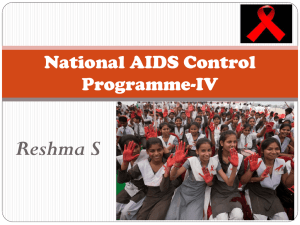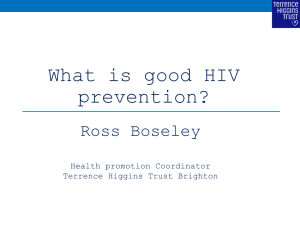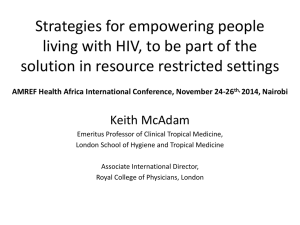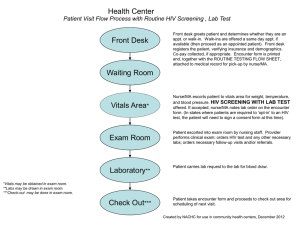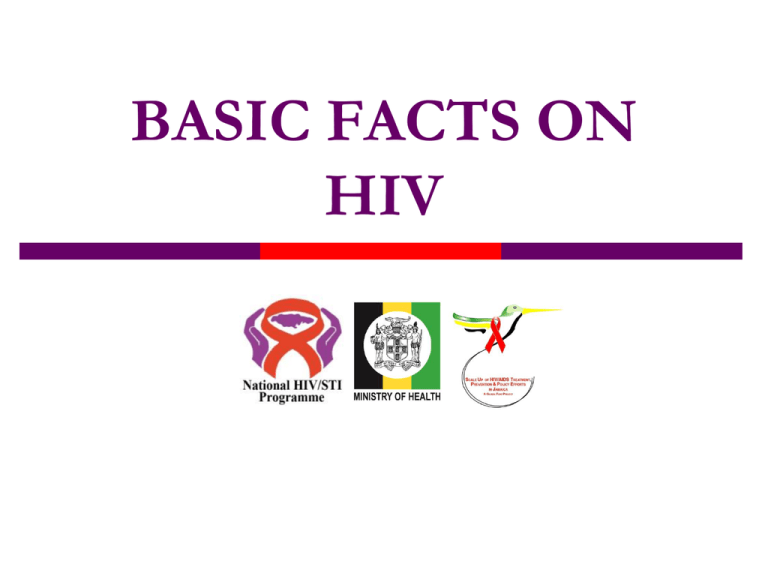
BASIC FACTS ON
HIV
What is HIV?
H -uman
Found only in humans
Transmitted among humans
Preventable by humans
I -mmunodefiency
Body lacks ability to fight off infections
V -irus
Type of germ
Lives and reproduces in body cells
4/8/2015
Copyright - National HIV/STI Programme
2
AIDS
A -cquired; received, not inherited (does not run
in families)
I -mmuno; protected from (in this case the
system protects the body from disease)
D -eficiency, - a lack of
S-yndrome; – a group of symptoms or
diseases
4/8/2015
Copyright - National HIV/STI Programme
3
HIV IS FOUND IN BODY
FLUIDS
Semen
Breast
milk
Blood
Vaginal
4/8/2015
fluid
Copyright - National HIV/STI Programme
4
How HIV is passed on?
During unprotected (skin to skin) sex (anal,
vaginal or oral)
Contact with HIV infected blood or blood
products
Sharing IV drug needles of HIV positive people
From HIV positive mother to child
During breast feeding
4/8/2015
Copyright - National HIV/STI Programme
5
You CANNOT get HIV from…
Tears
Saliva
Sweat
Urine
of an HIV infected person
4/8/2015
Copyright - National HIV/STI Programme
6
Window Period
When a person gets infected it may take 6
weeks or up to 3 months before antibodies
to HIV are detected in the blood
The HIV test looks for antibodies. When
these antibodies are detected the person is
diagnosed HIV positive
A person can be positive and the test shows
negative because the test was done during
the window period
4/8/2015
Copyright - National HIV/STI Programme
7
Why HIV rates not going down?
Sex at an early age
Little life-skills and sex education
Little condom use
Multiple partners
Stigma and Discrimination
Sex for money or sex for .....things
Substance abuse: Ganja, cocaine, alcohol
Men having sex with men & homophobia
Gender inequity and gender roles
4/8/2015
Copyright - National HIV/STI Programme
8
STI and HIV – The Link
Persons with a history of STIs are more likely to get
HIV because:
persons with STIs are more likely to have sores
and small breaks in the skin and lining of their
genitals.
HIV
can more easily enter the body through
these breaks.
4/8/2015
Copyright - National HIV/STI Programme
9
STI and HIV – The Link
You can get an STI by having sex without a condom,
with an infected person.
At the same time, you could be getting HIV which is
also contracted by having unprotected sex.
4/8/2015
Copyright - National HIV/STI Programme
10
ALL STIs are Preventable
Most STI’s are treatable
But
HIV/AIDS CANNOT BE CURED
4/8/2015
Copyright - National HIV/STI Programme
11
Prevention
4/8/2015
Treatment
Copyright - National HIV/STI Programme
12
Prevention
Talk with partner about HIV
Use a condom with your regular and nonregular clients, and partners every time
you have sex
Reduce the number of main partners
Get tested. Know your status
4/8/2015
Copyright - National HIV/STI Programme
13
Who is most at risk for HIV?
Anybody having sex without a condom.
People with more than 1 partner who
don’t use a condom during sex
People whose sex partner have sex with
other partners without using a condom
4/8/2015
Copyright - National HIV/STI Programme
14
How You DON’T Get HIV
You CANNOT get HIV by
hugging, touching,
living with or caring for
someone with HIV,
shaking hands or
kissing.
You CANNOT get HIV
from eating out of the
same plate or cup or
utensils that an HIV
positive person uses.
4/8/2015
Copyright - National HIV/STI Programme
15
Early Signs & Symptoms of HIV
Fever
Fatigue
Night Sweats
Loss of Appetite
Diarrhea
Swollen Lymph Glands
Remember these are symptoms of many other illnesses.
4/8/2015
Copyright - National HIV/STI Programme
16
REMEMBER
You CANNOT tell by looking if someone has
HIV.
An individual can look and feel well for many
years and be HIV positive.
The HIV positive person can pass the virus on
to someone else.
4/8/2015
Copyright - National HIV/STI Programme
17
Getting on with Life
4/8/2015
Copyright - National HIV/STI Programme
18
Can YOU support someone living with
HIV?
4/8/2015
Copyright - National HIV/STI Programme
19
What have we learnt?
4/8/2015
Copyright - National HIV/STI Programme
20

